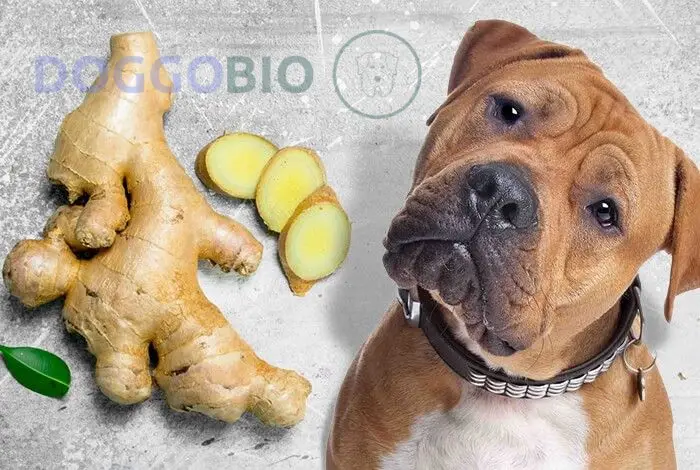Regarding the well-being of our furry companions, every responsible pet owner knows the importance of being cautious about what they eat.
A common question among dog owners is whether sharing certain human foods with their pets is safe. One such food that often sparks curiosity is ginger. Known for its distinctive flavor and potential health benefits in humans, ginger naturally raises the question: Can Dogs Eat Ginger? The short answer is that dogs can eat ginger, but there are some important considerations and guidelines to remember.
Can Dogs Eat Ginger?
Yes, dogs can safely eat ginger in small quantities. Ginger, a non-toxic spice, offers benefits like antioxidant properties, anti-inflammatory effects, and improved digestive and circulatory health for dogs.
When feeding ginger, it’s essential to consult a veterinarian and consider the dog’s needs. It can be given in fresh, powdered, or juice form, with a recommended amount of 10 to 25 mg per pound of the dog’s weight. Fresh ginger should be peeled and finely chopped or sliced before serving.
The Nutritional Value of Ginger for Dogs
Ginger is a root vegetable that belongs to the Zingiberaceae family. It is rich in essential vitamins and minerals such as vitamin C, magnesium, potassium, and manganese.
It also contains antioxidants and anti-inflammatory compounds that can benefit humans and dogs.
Benefits of Ginger for Dogs
- Anti-inflammatory Properties: Ginger contains compounds called gingerols, which have potent anti-inflammatory effects. This benefits dogs with arthritis, joint pain, and other inflammatory diseases.
- Digestive Aid: Ginger has been used for centuries as a natural remedy for digestive issues. It can help soothe an upset stomach, reduce nausea, and improve digestion. This can be especially helpful for dogs with motion sickness or a sensitive stomach.
- Boosts Immune System: The high levels of antioxidants in ginger can help boost the immune system and protect against free radical damage. This is particularly important for older dogs.
- Pain Relief: Due to its anti-inflammatory properties, ginger can also provide pain relief for dogs. It can be helpful for dogs suffering from muscle soreness, joint pain, or other types of pain.
- Freshens Breath: Ginger contains compounds that can help fight bad breath in dogs. Adding a small amount of ginger to your dog’s food can help keep their breath fresh and clean.
Risks of Feeding Ginger to Dogs
While ginger can provide numerous health benefits for dogs, it is also essential to be aware of potential risks.

1.Allergic Reactions
Some dogs may be allergic to ginger, so it is crucial to monitor your dog for any signs of an allergic reaction after feeding them ginger. Symptoms may include itching, redness, swelling, or difficulty breathing.
2.Digestive Upset
Too much ginger can cause digestive upset in dogs, leading to symptoms such as diarrhea, vomiting, or stomach pain. It is always best to start with a small amount and gradually increase the dosage to avoid any issues.
3.Interactions with Medications
If your dog takes any medications, it is essential to consult with your veterinarian before adding ginger to their diet. Ginger may interact with certain medications, such as blood thinners or diabetes medication.
How to Feed Ginger to Your Dogs?
Now that we know the potential benefits of ginger for dogs, let’s talk about how to feed it to them. Ginger can be given to dogs in various forms, including fresh, dried, or powdered.

1.Fresh Ginger
Fresh ginger can be grated or chopped and added to your dog’s food. It is essential to start with a small amount and gradually increase the dosage to avoid any digestive upset.
2.Dried Ginger
Dried ginger can be found in most health food stores and sprinkled on your dog’s food. Make sure to read the label and avoid any products that contain additives or preservatives.
2.Ginger Powder
Ginger powder can also be added to your dog’s food, but use it in moderation as it is more concentrated than fresh or dried ginger.
How Much Ginger Do You Give To Your Dog?
The amount of ginger given to a dog should be based on size and weight. As a general guideline:
- Extra-small Dogs (2–20 pounds): Less than 1/4 teaspoon of raw ginger.
- Small Dogs (21–30 pounds): Approximately 1/4 teaspoon.
- Medium Dogs (31–50 pounds): Around 1/2 teaspoon.
- Large Dogs (51–90 pounds): Up to 3/4 teaspoon.
- Extra-large Dogs (91+ pounds): Roughly 3/4 teaspoon.
It’s crucial to start with a minimal amount and observe the dog’s reaction before gradually increasing the quantity.
When Can We Discontinue the Use of Ginger?
The use of ginger should be discontinued or adjusted in the following situations:

- Adverse Reactions: If the dog shows signs of discomfort, such as gas, nausea, or an upset stomach after consuming ginger.
- Health Conditions: Dogs with bleeding disorders, undergoing surgery, or on Non-Steroidal Anti-Inflammatory Drugs (NSAIDs) should avoid ginger due to its blood-thinning properties.
- Special Diets: Dogs on prescription diets or with specific health conditions (like diabetes or heart disease) should have their ginger intake closely monitored or avoided.
- Pregnancy and Nursing: The safety of ginger for pregnant or nursing dogs is not well-established, so it’s advisable to avoid it.
- Veterinarian Advice: Always consult a veterinarian for personalized advice, especially if the dog has a chronic condition or is on medication.
Some Posts You Wanna Read More
- Can Dogs Eat Edamame?
- Can Dogs Eat Capers?
- Can Dogs Eat Figs?
- Can Dogs Eat Chestnuts?
- Can Dogs Eat Apricots?
- Can Dogs Eat Butternut Squash?
- Can Dogs Eat Eggplant?
- Can Dogs Eat Horseradish?
Frequently Ask Question
Can puppies eat ginger?
Yes, puppies can eat ginger in moderation. However, it is always best to consult your veterinarian before introducing new foods to your puppy’s diet.
Is ginger safe for pregnant dogs?
No, feeding ginger to pregnant dogs is not recommended as it may cause uterine contractions.
Can ginger be used to treat motion sickness in dogs?
Yes, ginger can help alleviate symptoms of motion sickness in dogs. It is best to give it to them about 30 minutes before traveling.
Can ginger be used to treat cancer in dogs?
No, while some studies have shown that ginger may have anti-cancer properties, it is not recommended to use it as a treatment for cancer in dogs without consulting with your veterinarian first.
Conclusion
In conclusion, when asking, “Can Dogs Eat Ginger?” the answer is a cautious yes. Ginger, in small, controlled amounts, can offer some health benefits to dogs, such as aiding digestion and reducing nausea.
However, it’s crucial to introduce ginger into your dog’s diet gradually and in moderation. Always consult your veterinarian before adding new food to your pet’s diet, especially if your dog has existing health conditions or is on medication.
While ginger can be a safe and beneficial addition to your dog’s diet, it should never replace professional veterinary care or prescribed medication. Being mindful and informed can help ensure your furry friend enjoys a healthy and happy life.

Pingback: Can Dogs Eat Eggplant? Discover the Benefits and Risks! 2024
Pingback: Can Dogs Eat Capers: Unlocking the Mystery 2024
Pingback: Can Dogs Eat Butternut Squash? Unlocking the Secret 2024
Pingback: Can Dogs Eat Horseradish? Unveiling the Toxic Truth! 2024